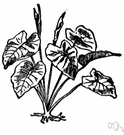Ed·da
(ĕd′ə)n.
1. A collection of Old Norse poems, called the Elder or Poetic Edda, assembled in the early 1200s.
2. A manual of Icelandic poetry, called the Younger or Prose Edda, written by Snorri Sturluson (1179-1241).
[Old Norse.]
Ed′dic adj.
American Heritage® Dictionary of the English Language, Fifth Edition. Copyright © 2016 by Houghton Mifflin Harcourt Publishing Company. Published by Houghton Mifflin Harcourt Publishing Company. All rights reserved.
Edda
(ˈɛdə)n
1. (Poetry) Also called: Elder Edda or Poetic Edda a collection of mythological Old Norse poems made in the 12th century
2. (Norse Myth & Legend) Also called: Younger Edda or Prose Edda a treatise on versification together with a collection of Scandinavian myths, legends, and poems compiled by Snorri Sturluson (1179–1241), the Icelandic historian and poet
[C18: Old Norse]
Eddaic adj
Collins English Dictionary – Complete and Unabridged, 12th Edition 2014 © HarperCollins Publishers 1991, 1994, 1998, 2000, 2003, 2006, 2007, 2009, 2011, 2014
Ed•da
(ˈɛd ə)n.
either of two medieval Icelandic literary works, the earlier one a collection of traditional poems on mythical and religious subjects, the later one a largely prose compilation by Snorri Sturluson that includes a survey of Norse mythology.
Ed′dic, Ed•da•ic (ɛˈdeɪ ɪk) adj.
Random House Kernerman Webster's College Dictionary, © 2010 K Dictionaries Ltd. Copyright 2005, 1997, 1991 by Random House, Inc. All rights reserved.
ThesaurusAntonymsRelated WordsSynonymsLegend:
| Noun | 1. |  edda - tropical starchy tuberous root edda - tropical starchy tuberous root root vegetable - any of various fleshy edible underground roots or tubers poi - Hawaiian dish of taro root pounded to a paste and often allowed to ferment Colocasia esculenta, dalo, taro plant, dasheen, taro - herb of the Pacific islands grown throughout the tropics for its edible root and in temperate areas as an ornamental for its large glossy leaves |
| 2. | Edda - either of two distinct works in Old Icelandic dating from the late 13th century and consisting of 34 mythological and heroic ballads composed between 800 and 1200; the primary source for Scandinavian mythology |
Based on WordNet 3.0, Farlex clipart collection. © 2003-2012 Princeton University, Farlex Inc.